Report of a public meeting held during the 15th National Meeting
The overall theme of the National Meeting, ‘The Media, Citizenship and Identities’, was a response to vigorous discussions about citizenship and identities in the context of the enactment of the controversial Citizenship Amendment Act (CAA) in December 2019, the plan for a nationwide National Register of Citizens (NRC) and plans to launch the National Population Registry. The panel discussion was an attempt to go beyond the divisive and polarised debate around these developments, and focus on the fundamental ideas underlying these procedures, the dynamics of the widespread opposition to them (with different nuances in the northeastern region and the rest of India), with special reference to a gender perspective on nationality, citizenship and belonging. It also addressed the need for sustainable solutions given the complex reality of migration.
The NWMI public meeting on February 7, held at the Indian Institute of Agricultural Technologists in Bangalore, focussed on the theme of citizenship, identity and migration. Emcee for the meeting, Sandhya Mendonca, welcomed the gathering and went on to give a brief history of the NWMI. She introduced the inaugural speaker for the evening, the award-winning novelist and one-time journalist Shashi Deshpande, whose novels have powerfully articulated issues faced by the contemporary Indian woman.
Shashi Deshpande began her address by observing that among all the different identities, citizenship is the one that concerns us the least in our daily life. She pointed to the curious phenomenon that Indian writers from all the Indian languages, including English, who lived and wrote in India, never thought of themselves as Indian writers and our nationality becomes important only when we go out of the country or when we are faced with a crisis like a war or watching a cricket match with Pakistan. But citizenship becomes important when we migrate, and migration is a fact of human history. The desire for a better life for themselves or their children makes people desperate to migrate to neighbouring countries. She then went on to speak of the biggest migration on the basis of religion in recent history – the Partition – which led to unimaginable cruelties.
The CAA, which has caused a great upheaval in the country today, brings us back to memories of the Partition, Shashi said. Although the law is said to not take away citizenship from anyone, this is only the partial truth. The exclusion of Muslims from the CAA was part of the agenda of the ruling party, and the debate in Parliament, she said, felt to her a mere formality. It seemed the Opposition had given up the fight before it started. So it was no surprise when the bill was passed. But it was the government which was taken by surprise when the students of Delhi’s Jamia Millia Islamia rose in protest against the law. While watching the events on TV, she said, she was flabbergasted by the violence unleashed on protesting students but also by the astonishing rapidity with which the protests snowballed throughout the country, with students in the lead. She said the protests against the CAA – protesting against the exclusion of Muslims from the right to seek refuge from religious persecution – were unique because of the absence of politicians or known leaders and also their voluntary and peaceful nature.
The Constitution had come out of law school classes and courtrooms and come alive, becoming the rallying point of the protestors, she said. She traced the antecedents of the Constitution to other declarations that went before – such as the Rights of Man, the American Declaration of Independence, the French Revolution’s principles of liberty, equality and fraternity. And then went into how the term secularism entered the Preamble to the Indian Constitution, and how it seems appropriate today: it pre-empts any discrimination on the basis of religion. However, the current government continues to be intransigent in the face of protests, and no conciliatory gestures are forthcoming. The attitude seems to be – if you’re not with us, you’re against us.
She said she was saddened by the anger and hate with which all parties were speaking, especially the ruling party. Even if the movement failed to achieve its objective of having the CAA revoked, she felt it would still have achieved a lot – as it has brought ordinary people, especially students and women, out on the streets fighting for an ideal – the rights enshrined in the Constitution.
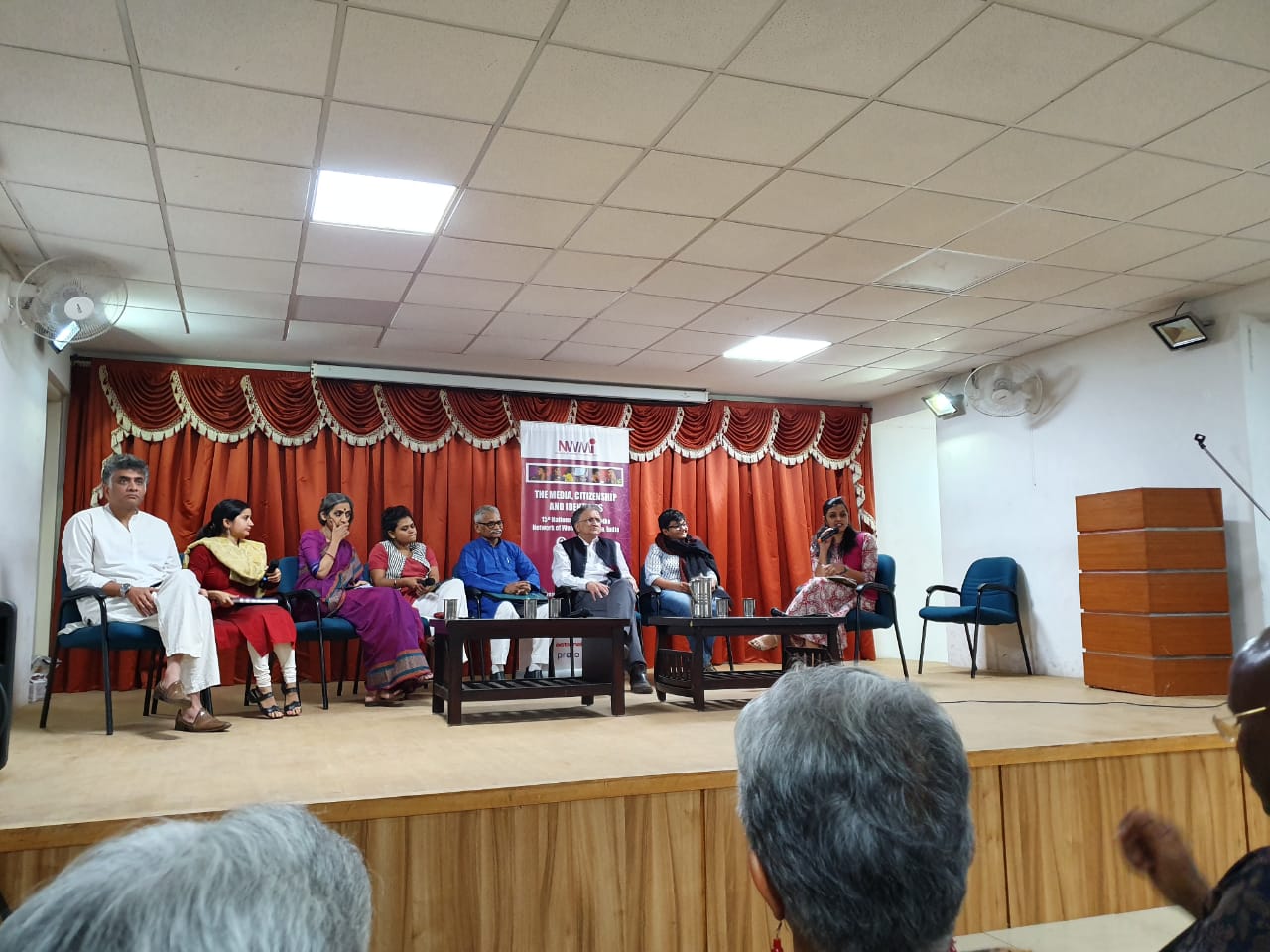
Shashi’s address was followed by a panel discussion moderated by journalist / author and NWMI member Rohini Mohan, who has reported extensively on the NRC in Assam and also on the CAA. The panellists comprised:
- Aakar Patel, columnist and author, who has translated Narendra Modi’s Gujarati biography and Saadat Hasan Manto’s Urdu essays to English
- Malini Bhattacharjee, Assistant Professor, Azim Premji University, who has researched nationalism and public policy, and published a book titled Disaster Relief and the RSS
- Madhu Bhushan, filmmaker and activist with the Gamana Mahila Samuha
- Vijeta Kumar, professor of English and journalism, St. Joseph’s College, and writer on gender and Dalit issues
- Ravi Varma Kumar, lawyer and professor, National Law School of India University, Constitutional expert and first chairperson of the Backward Classes Commission in Karnataka
- Ramachandra Guha, historian and author of books on cricket, environmental studies and Gandhi; and
- Teresa Braggs, communications student at Mount Carmel College, active in the anti-CAA protests.
Aakar Patel began by talking about the work his former workplace, Amnesty International, had done on the condition of people declared foreigners by tribunals in Assam. The approximately 1,000 people then in detention camps lived in conditions worse than that of convicts. They have no newspapers, no TV sets, no paid work, no way for them to meet their families. And this is what the government plans to bring to the rest of the country, he said. A report published by the National Human Rights Commission, which had sent a team to these camps, was ignored.
He said that in 1998, the then governor of Assam, Lt Gen (Retd) S K Sinha, sent a note to the Vajpayee government in Delhi to say the northeastern state was under “external aggression” because of the influx from neighbouring countries. Though there was no data to support his claim, in 2005, the Supreme Court took the governor’s report seriously enough to reverse the burden of proof – it now lay with the citizens, not the state. This set the ground for the NRC now, he explained.
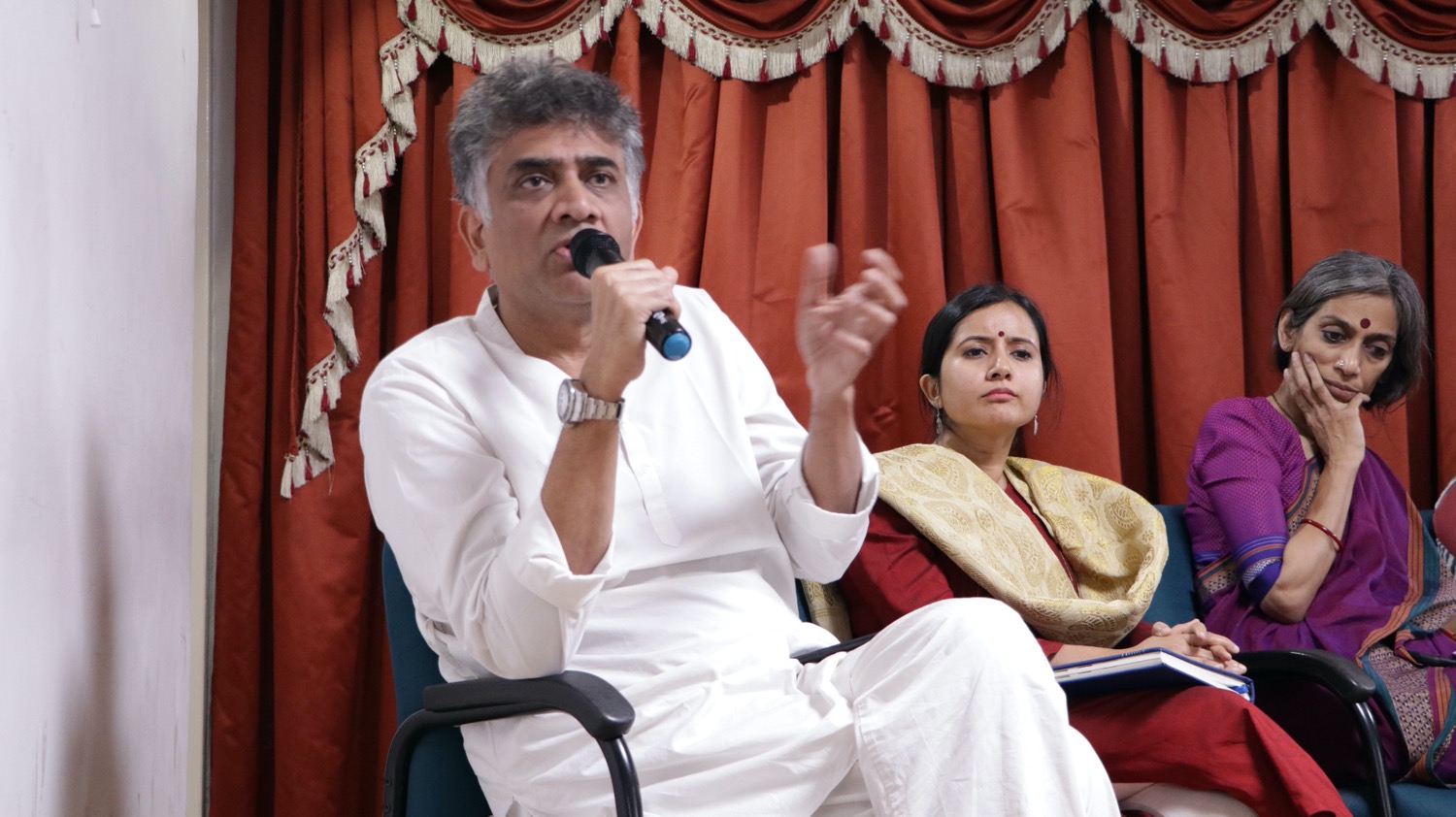
Everyone would have to line up and show documents to prove they were Indians. Of the list, the government would tick off those who were considered doubtful and they would be sent to a foreigners’ tribunal to prove yet again that they were citizens. When the terms of the tribunal members expired, and they went to court seeking reappointment, the Assam government submitted an affidavit which showed that those who had a high rate of marking people as foreigners were given extensions, while those with low rates were not.
In the NRC, the majority had documents, but minor errors such as date discrepancies led the government to brand people foreigners. As many as 19 lakh people were left out of the NRC, including many non-Muslims. That is why we have the CAA coming down on us, he said.
He concluded by saying that the reason why so many people from one community are on the streets protesting against the CAA and NRC all over the country is that they are aware of what has happened in Assam.
Malini Bhattacharjee said that contrary to the position she expected most others on the panel to take, she would speak in favour of the CAA. She emphasised a concept she had picked up when she was at the Jawaharlal Nehru University (JNU): differentiated citizenship. This is based on the assumption that the law is not a clinical positivist instrument that is applied generally. Law is constituted of social realities, historical realities and relationships between people. She acknowledged that perhaps this is not the best time to talk about the CAA, when there is unprecedented violence against students, and there are several insecurities the government is dealing with. The nuance that is needed in a discussion on the CAA is difficult today, she said, but perhaps this is the best time to have this discussion, because it is only during difficult times that convictions are tested.
She cited the example of marginalised sections of society such as women, Dalits and tribals. Her argument was: if she supports the Women’s Reservation Bill (also known as the The Constitution [108th Amendment] Bill, 2008), does that mean she does not acknowledge that men are not oppressed or that there are many women who are powerful and do not need a law like this? Her contention was that we would still support the Women’s Reservation Bill, just as we would support Dalit reservations, because – despite exceptions — there are historical reasons why it is important to support these sections of society. Similarly, there is a justification for supporting the move to offer refuge to those who have been systematically hounded in Islamic countries, and we should not oppose it just because they happen to be Hindus. About the denial of such refuge to the Ahmadiyyas, she said they played an important role in drafting the Lahore resolution which led to the Partition of India. So to equate their plight with that of Hindus fleeing Pakistan or Bangladesh is not persuasive, she said. At the same time she was not convinced that a Hindu would be able to use the safety net of the CAA to escape rigorous questioning during the NRC process.
She believed, however, that the CAA was not introduced at a good time as there were other priorities, such as economic reforms. Indian Muslims have fared even worse than Dalits, she said, and that had nothing to do with the CAA. The anger on the streets was legitimate because of the deplorable state of the Indian Muslim community. Their insecurity, already escalated by the Ayodhya judgement, was heightened with the CAA. Again, she stressed, citizenship is not a right; it is bound by conditions of national security.
She concluded by saying that while the anger was legitimate, a nuanced debate was needed on the CAA and NRC and that the discourse on secularism should not be framed around only the rights of minorities.
Madhu Bhushan said that besides the political, economic, legal and constitutional aspects of citizenship, she wanted to focus on the philosophical and personal dimensions. How do people perceive citizenship? She pointed out that although citizenship revolves around political and economic entitlements, it was also about being and belonging, which is at the heart of swaraj or self-rule, a concept encapsulated in the Constitution of India put together by BR Ambedkar and others.
According to her, it is ironical that this debate is raging in the land that revered the jangama, the anti-citizen, the spiritual traveller or ascetic who belonged nowhere and yet belonged everywhere. Be it the Bauls or the transgender or Hijra communities, or people like Mirabai, who forsook marriage and other social norms to seek a way of life that was unfettered, they may have been socially ostracised but culturally embraced. She acknowledged that we are living in the age of the nation state with political borders, built violently through the process of homogenisation, of exclusion, of the outsider and insider, who is legal and who is illegal, who is a doubtful citizen and who is kosher. Hitler’s Germany, the totalitarian Indian state and fundamentalist Islamic republics are prime examples of these modern nation states.
She then invoked German American philosopher Hannah Arendt, who wrote not merely about persecution by a totalitarian state because she was a Jew, but also about ordinary people responding to totalitarianism, and the banality of evil, which is what we are seeing in India today. When Arendt was naturalised as an American citizen, she said the right of citizenship was the right underlying all rights, the most fundamental right. Subsequently she became more sceptical and went back to a more core principle of the right to humanity. The right to humanity should be guaranteed by humanity itself, she said. According to her, a stateless person is not expelled from a country, he/she is expelled from humanity.
Against this philosophical backdrop, Madhu explained the notion of belonging from her own experience of working with the nomadic Hakki Pikki community. They name their members by the spaces they are born in (such as Division or Depot), eschewing the concept of settling anywhere. She then went on to examine the consequences of the NRC on such denotified tribes and communities, whose identities were not defined by statehood and most of whom have no address and therefore no access to documentation.
Vijeta Kumar drew from her experience of belonging to a Dalit community to lay out the irony of proving citizenship when marginalised. Her father, who was quite right-wing, she said, had to erase the fact that he was a Dalit but was still rejected by the country, she said. When he found out that she ate beef, he threatened to kick her out of the house. Then he said she should only eat it outside. She said she had to learn to look at him as a Dalit man, not as a man, thanks to her reading of Brahminical feminist literature. She said Dalits are not trained to accept this identity and instead are asked to hide it. So citizenship itself is an irony for him and for her. The country didn’t accept Dalits even if they gave up beef, scrubbed out Dalit markers from their bodies, became right-wing or even supported the CAA.
With poignant irony, she shared the example of her mother who moved into a Brahminical neighbourhood of Basavangudi. Initially their milk packets would be stolen every morning, but the day the Brahmin neighbours found out that they were Dalit, they stopped stealing the packets.
Ravi Varma Kumar made four legal points on the CAA. First, he said the question was not whether the CAA was good or bad but whether it was permissible under the Constitution. He pointed out that India took four years to draft the Constitution and, unlike other former British colonies, it was framed on Indian soil, not in Britain. As the tragedy of Partition was before us, our founding fathers ensured that the Constitution was secular and that religion was never taken as a basis for conferring a right or taking it away. After 70 years, the CAA has for the first-time used religion as the foundation for conferring citizenship.
Secondly, he queried why other forms of persecution, besides those based on religion, were not considered while framing the CAA. Why not human rights violations and economic distress? Why were tribals from these countries, who don’t practice one of the six religions mentioned in the Act, not included within its ambit? Why not atheists?
Thirdly, why were only three countries picked: why not Sri Lanka, why not Myanmar, why not Nepal? The three countries – Pakistan, Bangladesh and Afghanistan – have been picked because they can generate feelings that can polarise Indian society, he suggested.
Fourthly, he said, Home Minister Amit Shah spoke about religious persecution, but none of the provisions within the CAA mentions it. All the law says is that they should belong to the six religions mentioned and they should have entered India before December 31, 2014. Religious persecution is only rhetoric, not a legal qualification. So all such talk is misleading, he pointed out.
The NPR, the National Register of Indian Citizens (NRIC) was actually born in 2003 when the BJP was in power, Ravi Varma said, for the purpose of implementing the Indian Citizenship Act of 1955. According to him, neither the NPR nor the NRIC were legitimate because they were only mentioned in the citizenship rules. The NPR is an illegitimate instrument, he said. Unlike the Census that is only an enumeration, the NPR is an identification exercise and declares an individual as an ordinary resident. The objective of the NPR is to lay the ground for the NRC, he suggested.
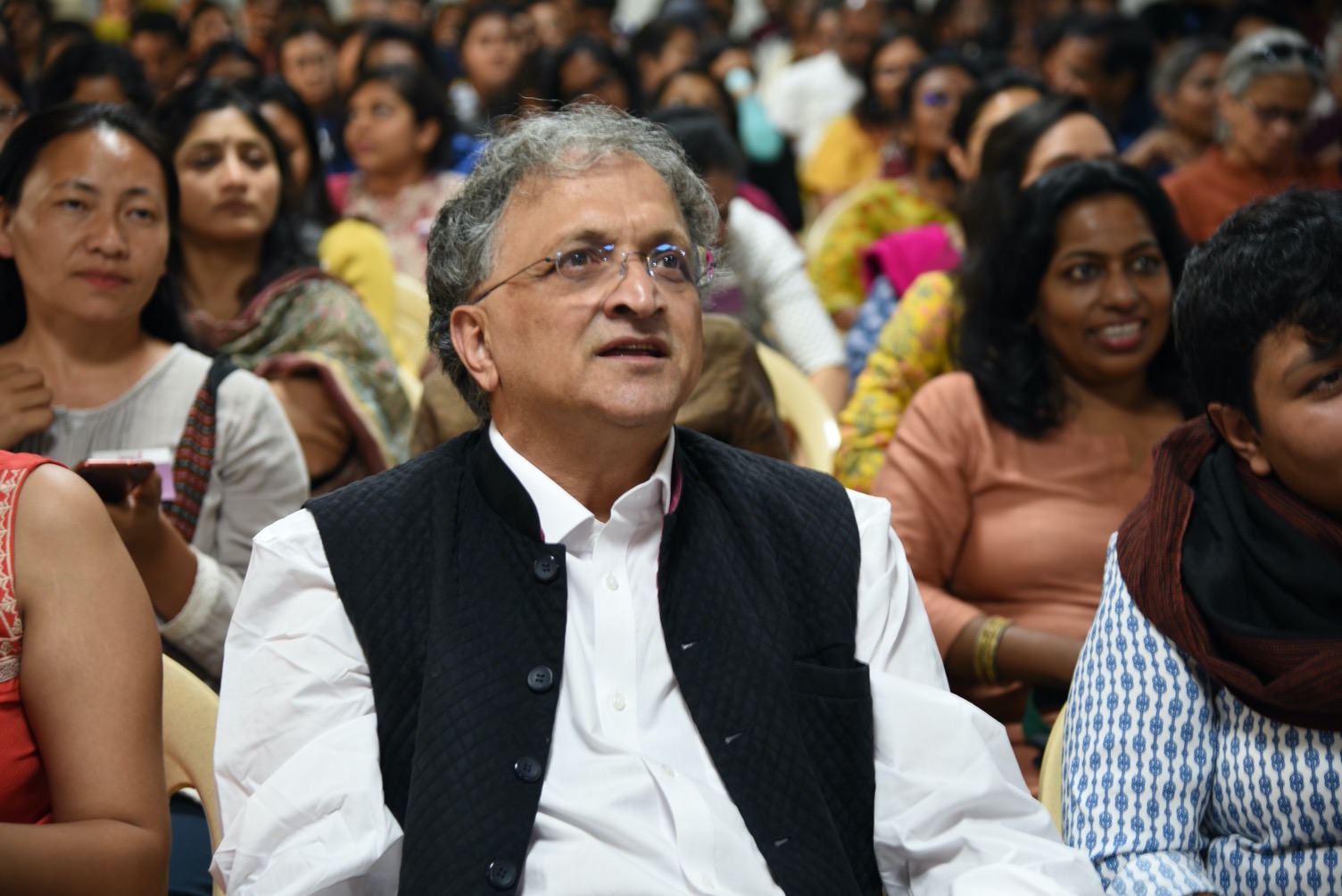
Ramachandra Guha spoke of the politics behind the CAA, NPR and NRC. The government has presumed that only Muslim states persecute, he said. This government is animated not by love of Hindus and Hinduism but by hatred and fear of Muslims. According to him, the intention of the CAA is to make Indian Muslims second class citizens, and the aim of the NRC is to intimidate and harass them.
Why was the CAA passed now? The timing was not coincidental, but displayed arrogance and hubris, he said. Before the CAA came the Ayodhya verdict and the abrogation of Article 370, which led to Kashmir being shut down. For six months, the sufferings of Kashmiris were ignored. As there was hardly any reaction to these two happenings, the government decided to go further and introduce the CAA, and intimidate Muslims further. The government thought there would be no reaction, but it turned out otherwise. There has been an extraordinary protest, he said.
The vandalising of the Jamia Millia University library on December 15 by the Delhi police was a turning point, said Guha. He pointed out that during the Quit India and JP (Jayaprakash Narayan) movements, the police did not vandalise university libraries. The reason was that the British and Indira Gandhi read books, he quipped. This is a government which hates ideas and independent thinking, he said, but vandalising a library would come back to haunt them. Students and minorities, supported by non-Muslims, are showing that the pall of fear has broken. This government is animated by vindictiveness and vengeance, not just against Muslims but also against anyone who disagrees with them, he said, but thankfully, citizens are rising up against them peacefully.
Teresa Braggs said there was a misconception that students began protesting against the imposition of Section 144 in Bangalore. The protest actually started earlier, on December 17, as a response to the events in Jamia. She also invoked Hannah Arendt’s concept of the banality of evil to say that the prerequisite for evil to become banal is that people stop talking about their experiences, communication is cut off and there is no room for logic to respond to rhetoric. The space for dissent is shrinking, and that is a symptom of neo-fascism, she said.
According to her, the carving out of space for dissent in the public sphere serves three needs. One, the need for the government to take note of our dissent, and not strip us of the rights and responsibilities to engage with what is going on in the country. Two, the need to shatter the picture the anxious right wing camp paints of an imagined and mythical other, the so-called Islamists and urban Naxals. The real picture of what these “anti-nationals” look like has students studying (often in candlelight), policemen tapping their feet to Hum Dekhenge sung by protestors, a poor Muslim girl coming to us early in the morning and saying can you please keep quiet because my mother is calling and she thinks I am in the hostel. Students, academics, and others are out there every day. Three, the need to make it clear that we are dissenting because we are patriotically, intellectually and experientially invested in the future of our country.
She said students like her were grappling with the question of identity. One has to give credit to the Hindutva-vadis and their attempts to form the Hindutva state for making it clear to us what we don’t identify with, she said. The students are calling this a revolution of love – we are saying yeh kamal nahin, guldasta hai (India is not a lotus, but a bouquet of flowers). This is the language we are forging as we go, she said, looking closely at the language and text of the Constitution and the freedom struggle. The expression of love comes as a reaction to the experience of fear, hopelessness and anger and with an understanding of the true nature of togetherness and identity, she said, to much applause from the listeners in the auditorium.
For the first time, religion-based discrimination has been enshrined in law, she pointed out. Any attempt to engage with the incumbent government results in us being labelled anti-nationals, Islamists or Urban Naxals. The self-corrective mechanisms of democracy no longer seem feasible, thanks to dynastic politics and the communalist agenda.
Protesting is a way of reclaiming the realities of the world we strive for: 1) a basic set of universal morals and values we are not willing to compromise on, 2) the idea of truth, and all dissent not being relegated to the theatre of combat, and 3) the political agency that is being systematically stripped from us. To say we have no choice is not correct, we are the choice, she said in conclusion.
Rohini Mohan then summed up the discussion by saying that the issue under debate was about how we belong – as families, as communities and as citizens. And how the structure of the CAA and NRC impacts this sense of belonging. She threw open the interactive part of the discussion by posing a question to the panel: why are some groups of people are more afraid and thinking more about the situation than others?
In response, Madhu Bhushan said that Indian Muslims have been more concerned, not just because of the CAA and NRC but because there has been a build-up over the past few years. It is not only the Ayodhya judgement or Kashmir or Triple Talaq. At every stage the Muslim community is made to feel like second, third and fourth class citizens, like they are constantly on trial, she said. Everything has added up and come together. The community has exploded now because they believe citizenship is a secular issue, and that this land is theirs as much as anyone else’s.
The way the Muslim women have come out on the streets is remarkable, Madhu said, as they face multiple layers of fundamentalism and multiple forms of patriarchy: the patriarchy of the state, the community and their own internalised patriarchy. Despite this, they were unwilling to take a break from their night-long vigil, saying, Ab nahin tho kab? (If not now, then when?). So the students on the one hand, and Muslim women on the other, have defined this struggle.
Rohini then called upon senior journalist from Assam, Durba Ghosh, to speak about the way the CAA is viewed in Assam, where the NRC has been a simmering issue for decades. Durba explained that the problem in Assam is not related to religion, Hindu or Muslim. It has to do with the influx of illegal migrants from Bangladesh into Assam, and the way every political party from the 1950s onwards has made this migration an election issue.
She was of the view that the CAA was yet another law meant to keep the illegal migrants issue simmering as an election issue. This law would only allow Hindu Bengali migrants access to citizenship, she pointed out, while the Bodos, etc., would be excluded. The indigenous populations in Assam were concerned about illegal migrants of any religion being given citizenship because land is limited. Where would these migrants fit in even in terms of space? Also, the language, culture and identity of indigenous groups would be threatened if migrants settled down on their land. In that sense, she said, the protests in Assam were different from those in the rest of the country.
Malini Bhattacharjee added a perspective from her experience as a Bengali who had grown up in Assam. She said that the Assam agitation was based on language, but the xenophobia was initially targeted at Bengali Hindus, not Bengali Muslims. Later the ire spread to Nepalis, Marwaris, etc., and only much later to the Muslim migrants. She also wondered why xenophobia based on language was deemed fine, but not xenophobia based on religion.
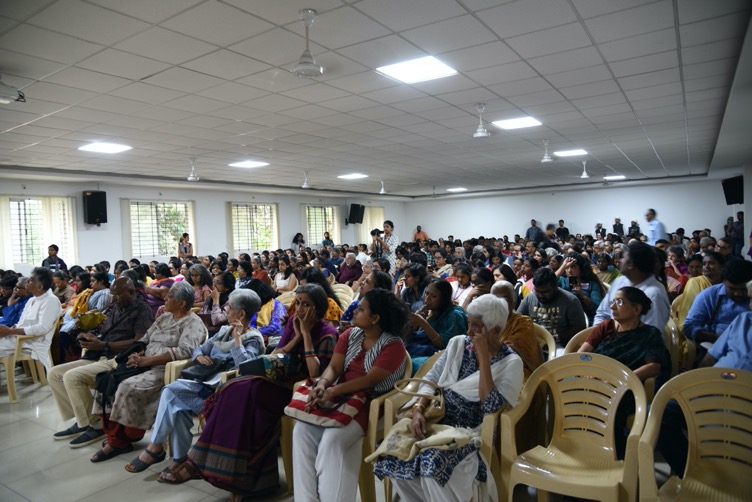
Some members in the audience from northeast India objected to Malini’s use of the word “xenophobia,” saying it was an unfair allegation.
After the engaging and thought-provoking discussion, Rohini thanked the speakers and attendees for their interaction.
Cultural programme: Rap by Wanandaf
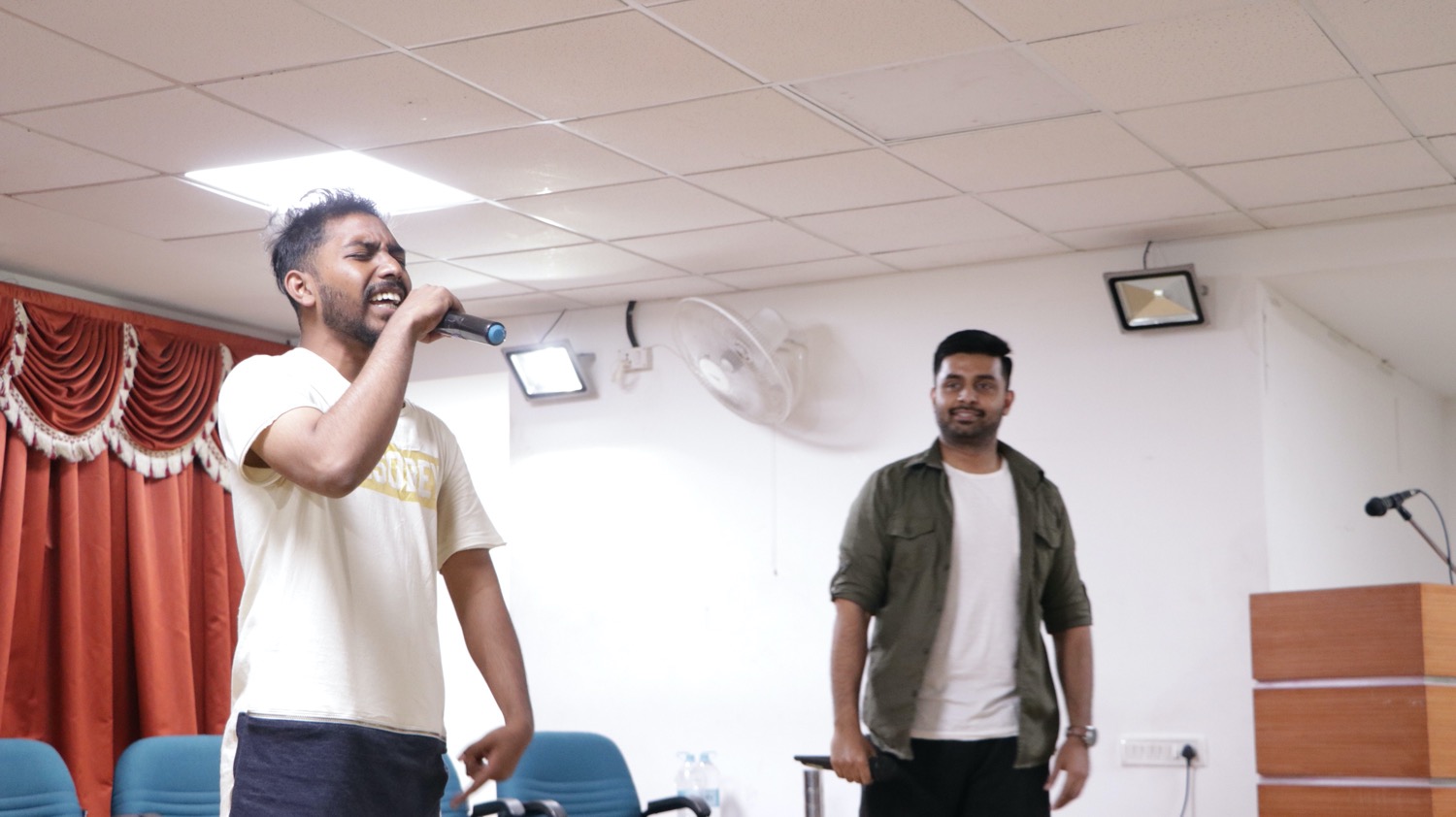
A group of rappers who call themselves ‘Wanandaf’ performed songs, also based on the theme of belonging and identity. The young artists are the latest sensation in the hip hop circuit of Bangalore, gaining a reputation by combining their art with current issues and pertinent problems. As they rapped in Kannada, Telugu and Hindi, a packed auditorium cheered and sang along. Many in the audience tapped their feet and clapped their hands to the music even when language was a barrier at times.
The Wanandaf troupe comprised Agaahi Raahi, Nex, Chetan and Vinil. The group’s name is derived from the perennial demand of Bangalore autorickshaw drivers for ‘one-and-a-half’ times the fare). The group does include a couple of women but they were not available for this performance.
“Since this is a meeting with a political undertone, we will use it to drive home our message,” Agaahi said. Among the several songs they performed was one of their hit numbers, which demands equality for all, with the audience joining in the ‘zindabad’ chorus. The ‘siyasat’ track by Nex was the final offering for the evening – a track that has brought both accolades and threats in equal measure for the group when they sang it as part of the NRC-CAA protests. “We have literally been lynched on the internet. We have received a lot of death threats,” said Nex.
The young musicians were rewarded with a standing ovation at the end of their energising performance.


